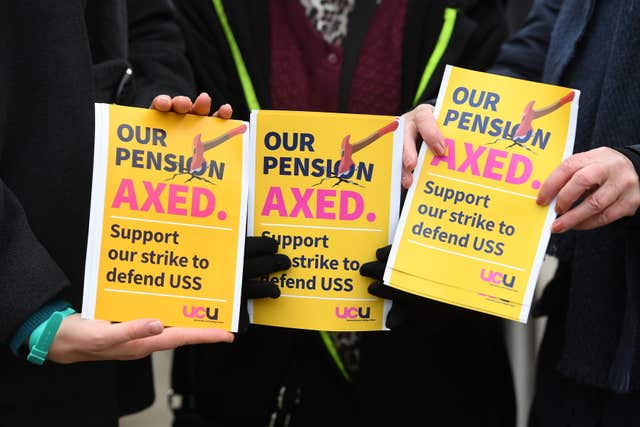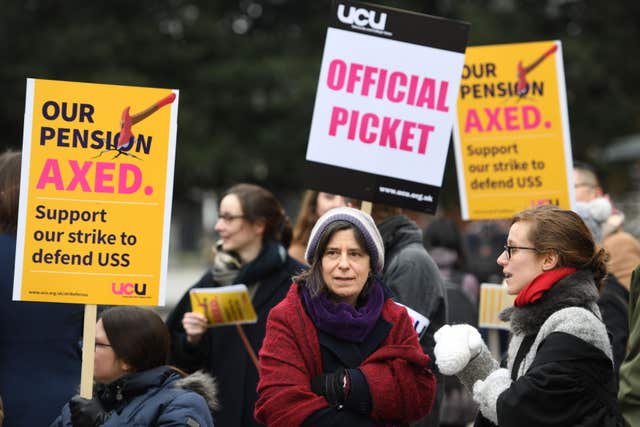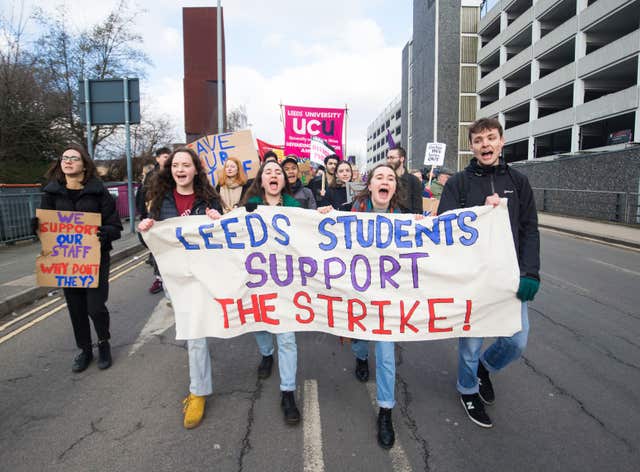
University bosses and union officials are being urged to find a solution to a bitter row over pensions, as workers took to picket lines over the issue.
Campuses around the UK are facing disruption as members of the University and College Union (UCU) stage the first wave in a planned month of industrial action.
Universities Minister Sam Gyimah called on both parties to get back to the negotiating table, saying he was “deeply concerned” about the impact strikes would have on students.
 University workers are striking at 57 universities (Joe Giddens/PA)
University workers are striking at 57 universities (Joe Giddens/PA)
Labour leader Jeremy Corbyn sent “solidarity and thanks” to university workers and urged employers to commit to negotiations.
The dispute centres on proposals put forward by Universities UK for changes to the Universities Superannuation Scheme (USS).
Universities UK (UUK) maintains that the pension scheme has a deficit of more than £6 billion that cannot be ignored, and that it has met union officials more than 35 times to discuss reforms.
The UCU has argued that the current proposals would leave a typical lecturer almost £10,000 a year worse off in retirement.
Statement on university strikes: I am calling on both sides to get back to the negotiating table, without preconditions, to find a solution that avoids further disruption to students pic.twitter.com/UDDALveega
— Sam Gyimah MP (@SamGyimah) February 22, 2018
Today, thousands of university staff will take part in the biggest strike our Higher Education sector has ever seen.
I join staff, students and @UCU in calling for the employers to commit to meaningful negotiations to resolve this dispute. pic.twitter.com/RMzWynVZXk
— Jeremy Corbyn (@jeremycorbyn) February 22, 2018
Tens of thousands of workers are thought to be involved in Thursday’s action, which is taking place at 57 universities, including Oxford and Cambridge.
Students have been joining lecturers on picket lines, while new polling published by the UCU shows that the majority of undergraduates (61%) support strike action by university staff, with nearly a fifth (19%) opposed.
It has been reported that tens of thousands of students have signed petitions demanding compensation for classes lost due to the strikes.
NUS President Shakira Martin gives her message of solidarity: “to our lecturers, we’re with you … to universities, you need to get around the table, sooner rather than later” @ShakiraSweet1 #ussstrike @ucu ✊✊✊ pic.twitter.com/cgmJMcXkqk
— NUS UK (@nusuk) February 22, 2018
In a video message, NUS president Shakira Martin told university workers “we are with you all the way” and urged employers to get back round the table.
The action has won the support of a number of university leaders, with the vice-chancellor of Newcastle University tweeting: “I absolutely support staff’s decision to strike.”
 The action will roll out to 64 institutions over the next few weeks (Joe Giddens/PA)
The action will roll out to 64 institutions over the next few weeks (Joe Giddens/PA)
Mr Gyimah said he had been speaking to both UUK and UCU.
“I am deeply concerned about the impact this strike will have on students, who deserve to receive the education that they are paying for. For many, this is a vital time in their studies,” he said.
He added: “I call on them to get back to the negotiating table, without pre-conditions, and to find a solution that avoids further disruption to students.
“Where any strike action takes place, we expect universities to keep a close eye on the impact on students, and to put in place measures to maintain the quality of education that they should receive.”
Without changes, universities could struggle to pay staff #pensions in the future. Find out more in our animation #USSstrike pic.twitter.com/gjFjbHGfAL
— Universities UK (@UniversitiesUK) February 22, 2018
In a video message, Mr Corbyn said: “On behalf of the Labour Party, I want to send solidarity and thanks for all the work you do in our universities and colleges. We are deeply concerned by the proposed changes to the USS that would leave our university staff up to £10,000 a year worse off in retirement.
“Downgrading the pension scheme will affect recruitment, retention, and ultimately our ability to offer world-class higher education.
“Everyone deserves the dignity and security in old age that comes from a decent pension.”
He added: “It’s been great to see strong support from students for striking staff, but for everyone’s sake we need to find a solution which avoids further disruption.
“So I join staff and students in calling for the employers to commit now to meaningful negotiations, through Acas if necessary, to resolve this dispute.”
Please see my response to today’s strike pic.twitter.com/ZzCYkMOUbQ
— Chris Day (@prof_chrisday) February 22, 2018
In his tweet backing striking workers, Professor Chris Day said: “I absolutely support staff’s decision to strike – I’m not sure what else they can do to express their concerns about the situation we now find ourselves in.
“This is a national dispute that cannot be resolved locally but I am meeting UUK today along with other vice-chancellors and will urge strongly that negotiations need to recommence.”
Professor Stuart Croft, vice-chancellor of Warwick University, has said he believes “industrial unrest” could have been avoided and called for a return to negotiations.
“I am therefore calling for an early return to negotiations, with a more open and imaginative approach from both parties.”
A number of universities told the Press Association that they were attempting to minimise disruption, but that figures on striking staff and students affected were not yet available.
Solidarity with @UCU educators on strike in defence of their conditions pic.twitter.com/2pAGtpgVAw
— Billy Bragg (@billybragg) February 22, 2018
John McDonnell on the first day of the @ucu strike @GoldsmithsUoL #strikeforuss #pensions #highered #HigherEducation pic.twitter.com/LhcdEa9Xem
— Goldsmiths UCU (@GoldsmithsUCU) February 22, 2018
UCU general secretary Sally Hunt said: “I have made it clear from the start of this dispute that this mess can only be resolved by negotiation.
“We have been calling for talks for weeks either directly or through Acas, so if UUK are willing to now meet without preconditions with a view to resolving this dispute this is good news.
“Students should never have been put in this position. I would like to thank the universities minister Sam Gyimah, Labour leader Jeremy Corbyn and student leaders for the pressure they have put on universities to start negotiating again. We wait to see what UUK has to say.”
 Students have been joining university staff on picket lines around the country (Danny Lawson/PA)
Students have been joining university staff on picket lines around the country (Danny Lawson/PA)
A UUK spokesman said: “Union leaders need to listen to the concerns of the Pensions Regulator and USS. Pensions risk is very real.
“Their dismissal of the funding challenges is hugely concerning, the very reason employers and the scheme must act responsibly to protect pensions and students.
“We remain at the negotiating table to engage with UCU on the long-term sustainability of the scheme and we continue to seek further talks. If a credible, affordable solution were to be put forward by the union, employers would want to consider it.
“This industrial action is targeted at students. It will be young people and the next generation of students who will also suffer if their education deteriorates because employers are forced to make cuts to pay more into pensions.
“Employers are committed to continuing to pay in 18% to staff pensions for the next five years, double the private sector average.”
Our latest press statement on the #USSstrike is on our website https://t.co/xVlfrcDQNZ pic.twitter.com/TMLhFakc1O
— Universities UK (@UniversitiesUK) February 22, 2018
Strikes will take place at 57 institutions on Thursday and Friday, with more over the next month if there is no resolution, building up to a five-day walkout in the week beginning March 12, by which time 64 universities will be affected.
Hundreds of thousands of university workers are understood to be enrolled in the USS pension scheme, mainly those working at older institutions established before 1992.


Why are you making commenting on The Herald only available to subscribers?
It should have been a safe space for informed debate, somewhere for readers to discuss issues around the biggest stories of the day, but all too often the below the line comments on most websites have become bogged down by off-topic discussions and abuse.
heraldscotland.com is tackling this problem by allowing only subscribers to comment.
We are doing this to improve the experience for our loyal readers and we believe it will reduce the ability of trolls and troublemakers, who occasionally find their way onto our site, to abuse our journalists and readers. We also hope it will help the comments section fulfil its promise as a part of Scotland's conversation with itself.
We are lucky at The Herald. We are read by an informed, educated readership who can add their knowledge and insights to our stories.
That is invaluable.
We are making the subscriber-only change to support our valued readers, who tell us they don't want the site cluttered up with irrelevant comments, untruths and abuse.
In the past, the journalist’s job was to collect and distribute information to the audience. Technology means that readers can shape a discussion. We look forward to hearing from you on heraldscotland.com
Comments & Moderation
Readers’ comments: You are personally liable for the content of any comments you upload to this website, so please act responsibly. We do not pre-moderate or monitor readers’ comments appearing on our websites, but we do post-moderate in response to complaints we receive or otherwise when a potential problem comes to our attention. You can make a complaint by using the ‘report this post’ link . We may then apply our discretion under the user terms to amend or delete comments.
Post moderation is undertaken full-time 9am-6pm on weekdays, and on a part-time basis outwith those hours.
Read the rules here